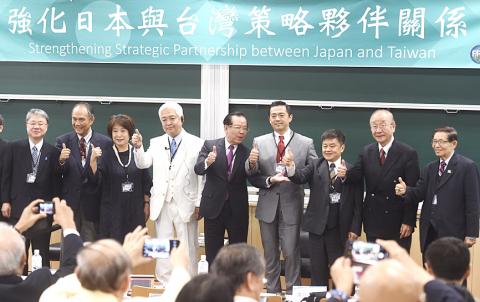Japan should enforce a law parallel to the US’ Taiwan Relations Act (TRA) to consolidate its partnership with Taiwan, Jikido Aeba, a Japanese lawmaker and academic, told a seminar in Taipei yesterday.
He is also concerned about Taiwan’s security in the face of mounting Chinese pressure, Aeba told a seminar titled Strengthening Strategic Partnership between Japan and Taiwan, which was organized by the Formosa Republican Association and the Japanese Conservative Union (JCU) at National Taiwan University.
Taiwan’s future is at stake in its presidential and legislative elections on Jan. 11, while it is expected to face more pressure from China after the elections, said Aeba, who is chairman of the JCU.

Photo: Chien Jung-fong, Taipei Times
While many Japanese hope support for Taiwan can be bolstered, the past 70 years has seen mostly economic collaboration, he said.
Democratic partners, such as Japan, the US, India, Australia and South Korea, should support Taiwan, while Tokyo should announce that it would guard Taiwan if it faces security threats, he said.
The Japanese government should establish a Taiwan-Japan relations bill, while amending its constitution to enable the Japan Self-Defense Forces to defend its Asian partners, he said.
It is important for Japan that Taiwan maintains its democracy and freedoms, said Genki Fujii, a Japanese academic of international affairs.
If Taiwan were annexed by China, Japan’s security, economy and social prosperity would be affected as well, Fujii said, adding that the destinies of Taiwan and Japan are closely tied.
Taiwan has followed Japan in its economic development and grown into a democracy, and its political and economic achievements are remarkable in Asia, he said.
By contrast, China falsely claims to have a capitalist system, but it steals ideas from other countries, he said.
He asked how China could lead a nation as advanced as Taiwan.
As an outsider, Taiwan is a great country, Fujii said, calling on Taiwanese to be more confident.
Taiwan-Japan ties should be consolidated through legislation, he said, adding that the Japanese government should enforce a parallel version of the TRA.
While the issue is not yet on the Japanese government’s agenda, some lawmakers have expressed an interest in it, he said, adding that the JCU would continue lobbying for the issue, even though it might take some time.
Steve Bannon, a former White House strategist for US President Donald Trump, gave a recorded speech at the seminar.
Taiwan’s elections next month are about defending independence and freedom, which is far more important for the region and the entire world, especially as the Chinese Communist Party continues to enslave its people and threaten regional order, Bannon said.

A Ministry of Foreign Affairs official yesterday said that a delegation that visited China for an APEC meeting did not receive any kind of treatment that downgraded Taiwan’s sovereignty. Department of International Organizations Director-General Jonathan Sun (孫儉元) said that he and a group of ministry officials visited Shenzhen, China, to attend the APEC Informal Senior Officials’ Meeting last month. The trip went “smoothly and safely” for all Taiwanese delegates, as the Chinese side arranged the trip in accordance with long-standing practices, Sun said at the ministry’s weekly briefing. The Taiwanese group did not encounter any political suppression, he said. Sun made the remarks when

The Taiwanese passport ranked 33rd in a global listing of passports by convenience this month, rising three places from last month’s ranking, but matching its position in January last year. The Henley Passport Index, an international ranking of passports by the number of designations its holder can travel to without a visa, showed that the Taiwan passport enables holders to travel to 139 countries and territories without a visa. Singapore’s passport was ranked the most powerful with visa-free access to 192 destinations out of 227, according to the index published on Tuesday by UK-based migration investment consultancy firm Henley and Partners. Japan’s and

BROAD AGREEMENT: The two are nearing a trade deal to reduce Taiwan’s tariff to 15% and a commitment for TSMC to build five more fabs, a ‘New York Times’ report said Taiwan and the US have reached a broad consensus on a trade deal, the Executive Yuan’s Office of Trade Negotiations said yesterday, after a report said that Washington is set to reduce Taiwan’s tariff rate to 15 percent. The New York Times on Monday reported that the two nations are nearing a trade deal to reduce Taiwan’s tariff rate to 15 percent and commit Taiwan Semiconductor Manufacturing Co (TSMC, 台積電) to building at least five more facilities in the US. “The agreement, which has been under negotiation for months, is being legally scrubbed and could be announced this month,” the paper said,

MIXED SOURCING: While Taiwan is expanding domestic production, it also sources munitions overseas, as some, like M855 rounds, are cheaper than locally made ones Taiwan and the US plan to jointly produce 155mm artillery shells, as the munition is in high demand due to the Ukraine-Russia war and should be useful in Taiwan’s self-defense, Armaments Bureau Director-General Lieutenant General Lin Wen-hsiang (林文祥) told lawmakers in Taipei yesterday. Lin was responding to questions about Taiwan’s partnership with allies in producing munitions at a meeting of the legislature’s Foreign Affairs and National Defense Committee. Given the intense demand for 155mm artillery shells in Ukraine’s defense against the Russian invasion, and in light of Taiwan’s own defensive needs, Taipei and Washington plan to jointly produce 155mm shells, said Lin,